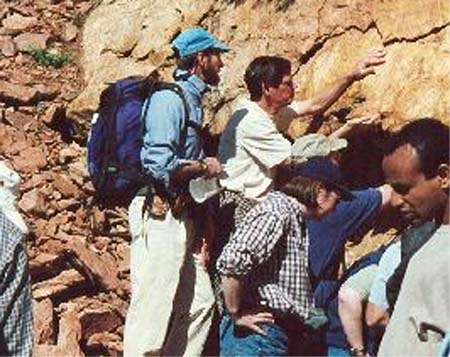
Geologists in the Peace Corps, Ghana, 1965 - 7
GEOLOGISTS IN THE PEACE CORPS, GHANA, 1965-1967
CASTOR, Stephen B., Nevada Bureau of Mines and Geology, Univ of Nevada, mail stop 178, Reno, NV 89557, scastor@unr.edu and RIPLEY, David P., North Dakota State Water Commission, 900 E. Boulevard, Bismarck, ND 58505-0850
In 1965, thirteen volunteers, with an average age of 23, traveled to Ghana, West Africa, to begin two-year tours as geologists for the U.S. Peace Corps (USPC).
Now, nearly 40 years later, we look back on their service, particularly in terms of professional development. The young geologists were assigned to the Ghana Geological Survey (GGS). They worked on projects in scattered, sometimes remote locations.
Projects included mineral exploration; bauxite and kaolin resource drilling; chromium, gold, and stone deposit evaluation; quadrangle geologic mapping; and geochemical laboratory supervision.
For most, duties not only encompassed geologic work, but also direction of as many as 100 native employees, including payroll, housing, and equipment oversight, in a cumbersome bureaucratic system left over from colonial times. For the most part, the work was carried out without significant professional supervision from the GGS or the USPC.
Despite frustrations, many of the volunteers quickly gained an understanding of professional methods. In general, they enjoyed the challenges and derived satisfaction from the work. One volunteer extended his tour for one year, and another returned later as an expatriate GGS employee. Tragically, one volunteer was killed in a car accident.
Upon their return to the U.S., many of the volunteers attended graduate school in geology, and five became professional earth scientists. However, only three are now geoscientists: a USGS international minerals specialist; a state water commission hydrogeologist; and a state geological survey research scientist. Mostly, the returned volunteers left the geosciences field for other endeavors. Examples include ceramic engineering, medicine, real estate development, horticulture, and high school teaching. For most of these volunteer geologists, the USPC experience was an important factor professionally; they gained a sense of their own capabilities and a real feeling for how the world works.
2003 Seattle Annual Meeting (November 2?5, 2003)
Session No. 14
Geologists in the U.S. Peace Corps: The Contribution of Peace Corps Geologists to International Development and the Contribution of the Peace Corps Experience to the Development of the Geosciences in America
Washington State Convention and Trade Center: 400
8:00 AM-12:00 PM, Sunday, November 2, 2003
